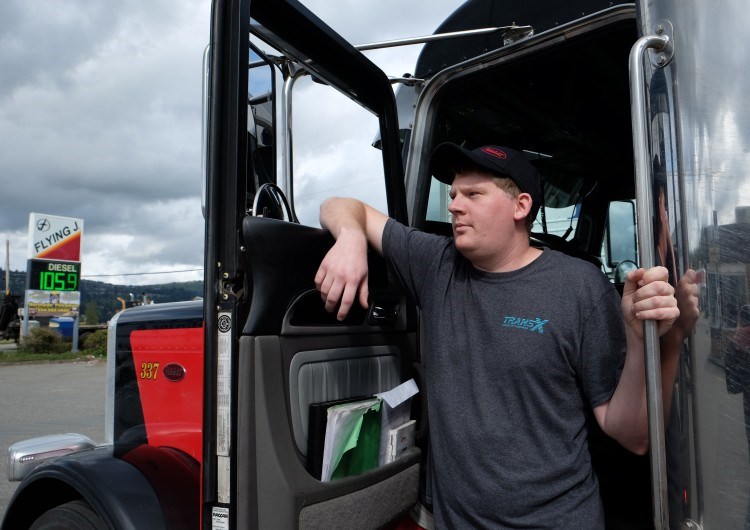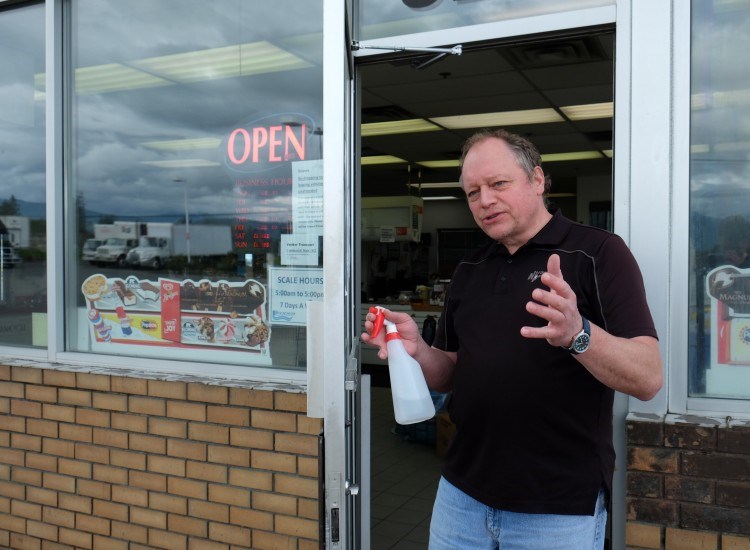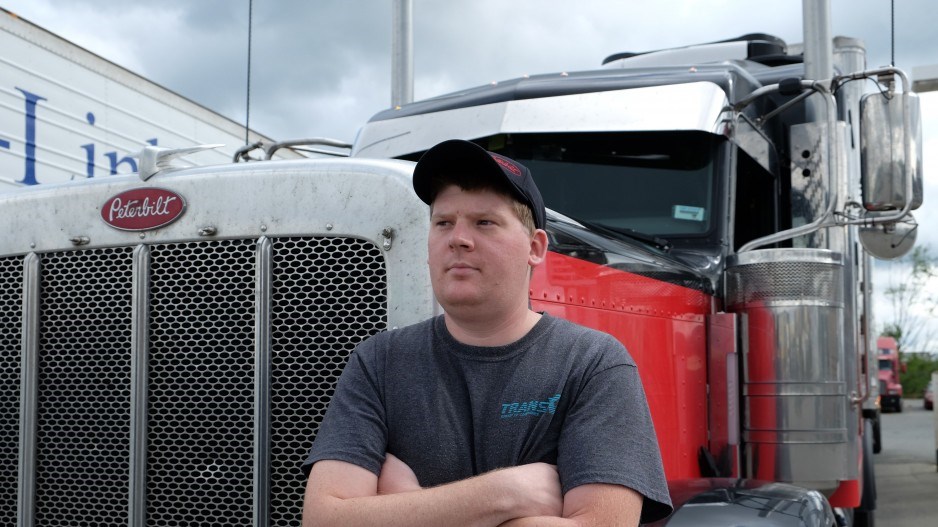Long-haul truck driver Thomas Bradbury has seen a lot of North America in his five years of criss-crossing his native Canada and motoring along the highways of the United States, from the postcard-like landscape of the Prairies to big bustling Manhattan and south to the vastness of Texas.
And like any trucker, he’s got some stories.
There was the bad wreck he had in Burlington, Ont., where the force of the crash caused him to break his steering wheel in half.
“I wasn’t at fault, and the doctors were surprised I didn’t break off my arm from holding the wheel so tight,” he said of the collision involving a mini-van and a Honda Civic.
Then there was his recent trip through the same intersection in Saskatchewan where most of the Humboldt Broncos junior hockey team were killed in a bus crash in the spring of 2018.
“I just about puked halfway down the road,” he said. “Now there’s big signs there that say, ‘Slow down, save lives.’ Yeah, I guess so, right.”
His latest road tale, which he told Thursday while filling up his truck at a gas station in Abbotsford just north of the Sumas border, revealed the extraordinary times he now lives in as a trucker.
The Calgary resident was in Mississippi a couple of weeks ago. He was delivering a load of produce to a Walmart distribution centre, when the local sheriff’s department contacted him.
“They said we’re here to give you a police escort to Walmart,” said Bradbury, a 26-year-old father of two young kids. “I said, ‘You are? Why?’ They told me people might hijack the load. I said I’d like to see them try.”
He safely delivered the produce, with two armed deputies at the ready for an ambush. Bradbury found it “a bit weird,” but understood the need for precautions.
“Right now, produce is like gold.”
Essential service
Like thousands of truckers in Canada and the U.S., Bradbury is performing what governments have described as an essential service, picking up and dropping off food on both sides of the border.
In many ways, truckers are keeping economies from total collapse by feeding the millions of people lined up at grocery stores in their protective masks and gloves to stockpile food.
When Glacier Media met Bradbury at the Flying J card lock on Sumas Way, he had just returned from delivering 18 pallets of frozen meat, weighing about 500 pounds each, to a warehouse in Kent, Wash.
The meat came from Calgary.
His next stop was Rosedale, near Chilliwack, to pick up another load of produce or plants and haul it south to Chicago. He was four days into what will likely be three weeks on the road, driving thousands of kilometres to ensure North Americans get fed.

More space on roads
Bradbury does his driving behind the wheel of a shiny black and red Peterbilt tractor attached to a 53-foot freezer trailer. Inside his cab, he’s got a bed, a fridge and a microwave to warm up the several days of meals his wife prepared.
His stereo is tuned to country music.
“I grew up on it,” he said, noting his father David is also a country music-loving trucker, and was on his way home from a run to California.
Bradbury works for Hardline Transport Solutions out of Moose Jaw, Sask., one of several companies he’s hauled goods for in his five years as trucker; he’s able to keep the truck at home in Calgary to avoid travel to headquarters.
The former golf course landscaper began his career in Ontario, where he covered the eastern seaboard. He moved from job to job seeking better pay and experience, saying it’s a profession that now earns him a good living.
“Even though I’ve got a wife and two kids at home, and I can be away from them for a long time, it’s become a lifestyle, it’s something you get used to and adjust to. I love it, actually.”
What do you love about it?
“The brotherhood. It’s not like it used to be, but I can drive something that nice [pointing to his truck] down the road and get respect from the guys. I’m starting to see some of that on the road now, too.”
How so?
“Lot of people want me to do this now,” he said, motioning with his arm to pull down the cable to activate his truck’s horn. “So that’s kind of cool, but I mean you still get the odd guy who doesn’t care and will cut you off.”
The widespread physical distancing measures and orders for citizens to stay home in both countries have given Bradbury more space on the roads. It’s allowed him to shave off time in some of his trips, estimating it took him just under two hours to drive from Kent, Wash. to the Sumas border.
But that bit of relief on the roads also requires him to make the necessary precautions when he stops at a card lock or rest stop, knowing the virus could be anywhere.
“I’m in the truck all the time,” he said. “If I go into a truck stop, I’ll grab something to eat and go back to the truck, wipe down the dash and everything else, and do everything I can to keep things clean.”

No showers, no sandwiches
It’s what he did after he used the washroom Thursday at a convenience store in the lot of the Flying J card lock. That’s where Bradbury met Fred Hoekstra, who manages the store operated by Northside Petroleum.
Hoekstra would normally be driving a truck as part of the oil sales part of the business, but two store employees stopped working because of COVID-19; one has a compromised immune system, the other couldn’t work because she and her husband fell sick.
“She’s been sick now for four weeks,” he said, noting the woman’s doctor suspects she contracted the virus.
He pointed out that when the coronavirus outbreak occurred in February in Washington State, the store continued to be visited by truckers from the state, some of whom were sick.
“That was a big concern for us,” he said, adding that he does his best to ensure physical distancing is practised in the store.
The store used to have sandwiches for truckers, but the supplier closed down. Showers are not in use because Hoekstra can’t find anyone willing to clean them.
Coffee is no longer provided.
Washrooms, which are located on the side of the store, are offered on a limited basis, with Hoekstra up front with customers about the potential transmission of COVID-19.
“I give them the key and explain the situation,” said Hoekstra, who carries a spray bottle of alcohol-based cleaner with him, meticulously wiping the store’s front door handle and surfaces on the counter. “We’re not a busy site, and not a lot of people use it, but I’m trying to help them as much as I can.”
Some truckers, he said, won’t come in the store, but trust Hoekstra to take their debit card and ring a sale through for them, whether it be for a chocolate bar or diesel exhaust fluid.
He sprays down the card before he returns it.
“From the driver’s point of view, they’re very grateful for whatever they do get,” he said. “For us, as a store that’s not really worth being open right now, it tells us it’s good to be here, to be able to help out.”
Added Hoekstra: “Every day that goes by, I keep thinking how can I do things better. That’s what I want to do, but I don’t really have the answers.”
‘I felt terrible for two-and-a-half weeks’
When Bradbury crossed the Sumas border back into Canada, he noticed a COVID-19 testing station for incoming travellers.
He is exempt as a trucker from taking a test, but shared that he believes he might have contracted COVID-19 in December. He never got tested, noting he wasn’t familiar with the disease at the time.
The spread of the virus was also not news in Canada in December, with B.C. reporting its first case in late January. Since then, at least 42,000 people in Canada have tested positive for the virus, and more than 2,100 died.
A couple weeks before Christmas, Bradbury agreed to drive a friend’s car from Leduc, Alta. to Ontario, where his friend had recently moved.
Along the way, he came down with all the symptoms of the novel coronavirus — headache, fever, cough, the sweats, hard to breathe at times and a runny nose.
He checked himself into a hospital in Regina, where he stayed for more than eight hours. The doctors diagnosed his illness as a viral infection and told him to take Tylenol and Advil to reduce the fever.
“I felt terrible for two-and-a-half weeks, and it made for a long trip to Ontario,” he said.
Still, despite reports about people possibly having immunity after contracting the virus, Bradbury said he knows the consequences of falling sick are not good for his bank account.
“I’ve got to keep working to pay the bills,” he said, noting he is grateful to have a job when so many have lost theirs, including his school bus-driving aunt and cousin.
Before he left to pick up his next load in Rosedale, Bradbury agreed to have a few photographs taken outside his truck. The roar of semi-trailers coming from and to the border drowned out some of his words.
But he made sure these ones were heard.
“I’m hoping we can beat this and life can go back to the way it used to be,” he said before climbing in his truck. “So when I’m back home, I can take my wife and kids out. I’d like that. We were planning a trip down here to Vancouver. My wife’s never been, so that would be nice. Now with all this going on, maybe next year.”




